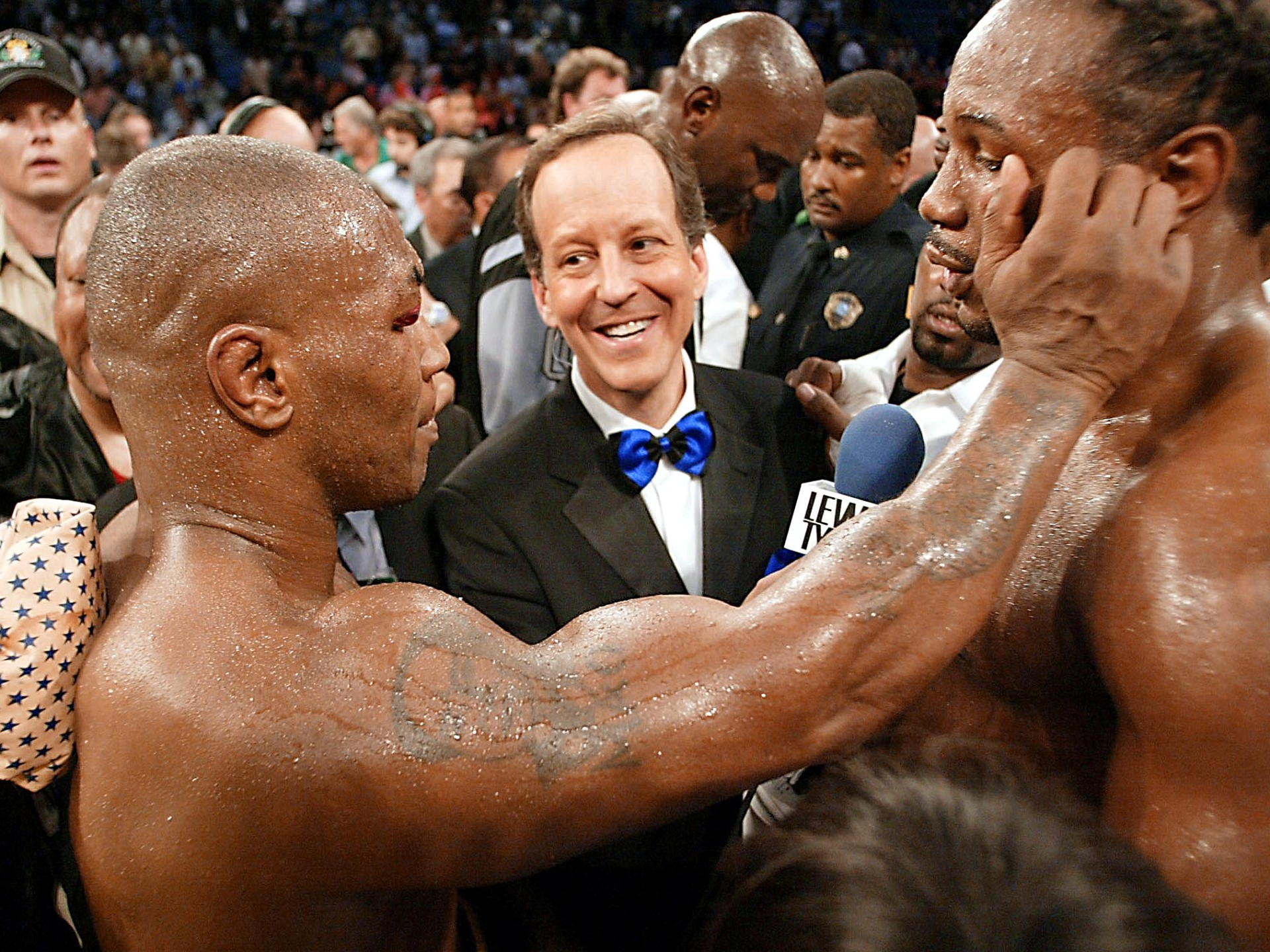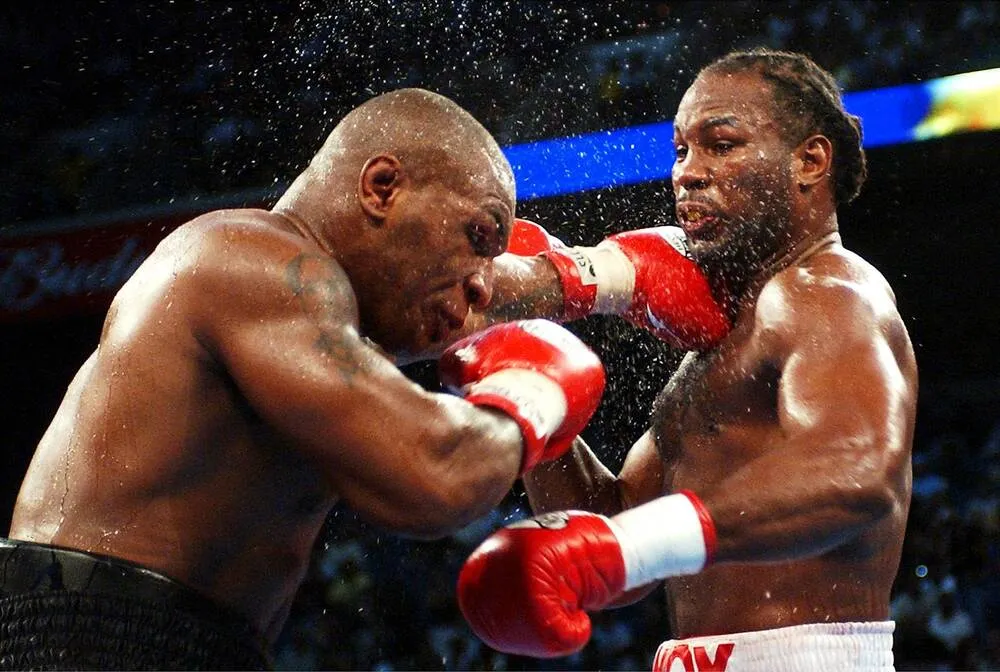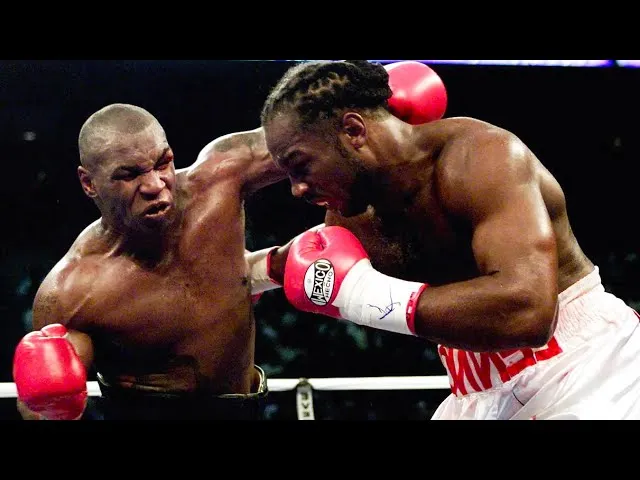Few fights in boxing history carry the weight of emotion, controversy, and personal stakes like the Mike Tyson vs. Lennox Lewis showdown. This wasn’t just a battle for a title—it was a collision of pride, legacy, and the fierce desire to prove something far deeper than dominance in the ring.
Tyson himself reflected on the encounter with brutal honesty, stating, “Lennox Lewis, he’s a good fighter, a great champion, but our fight, it was more than just boxing. It was personal. I had something to prove, not just to him, but to myself, to the world.”

But what really happened during this historic fight? What was the truth behind Tyson’s struggle—not just in the ring, but within himself? Let’s dive into the shadows of this iconic battle and explore why it was a defining moment in both fighters’ careers.
The Build-Up: More Than Just Trash Talk
Before fists flew, words did. Tyson was never one to shy away from intimidation, and in the lead-up to the fight, his tactics were as aggressive as ever. He wasn’t just promoting a boxing match; he was creating a storm of fear, anticipation, and chaos.
Tyson famously said he would “end” Lewis, making bold and terrifying claims that pushed the boundaries of traditional fight hype. But beneath the surface of his bravado was a deeper battle—a man fighting against the fear of becoming irrelevant, of losing the aura of invincibility that had defined his early career.
“I wanted to be feared again,” Tyson admitted. “But Lewis, he showed me that respect comes from skill, from heart, not just from intimidation.”
This statement speaks volumes about Tyson’s inner turmoil. The fight wasn’t just about knocking out an opponent; it was about reclaiming a lost identity, about proving that “Iron Mike” was still the most dangerous man on the planet.
But Lennox Lewis wasn’t a fighter easily intimidated. Calm, calculated, and fiercely determined, Lewis saw through Tyson’s tactics. He wasn’t just preparing for punches—he was preparing for a psychological war.
The Night of Reckoning: Tyson Meets His Match
When Tyson and Lewis finally stepped into the ring on June 8, 2002, the atmosphere was electric. The tension that had been building for months erupted into one of the most intense showdowns in boxing history.
But from the opening bell, it became clear—this was going to be a different fight than Tyson had anticipated.
Lewis fought with precision, patience, and brutal power. He didn’t fall into Tyson’s traps. He didn’t flinch at the threats. Instead, Lewis displayed a masterclass in boxing, using his reach, technique, and superior conditioning to keep Tyson at bay.
Tyson later reflected on this with respect: “In the ring, he showed me what a true champion does. He outsmarted me, outboxed me, and I had to give him respect for that.”
The fight ended in the eighth round when Lewis delivered a powerful right hand that sent Tyson crashing to the canvas. The world watched in stunned silence. The unstoppable force had met an immovable object—and Tyson knew it.
This wasn’t just a defeat; it was a humbling realization that strength and intimidation alone wouldn’t guarantee victory.
The Aftermath: Respect, Redemption, and Reflection
The post-fight scene was one of raw emotion. Tyson, a man known for his ruthless aggression, showed something unexpected—honor and humility. He embraced Lewis, acknowledging the better man that night.

And while Tyson lost the fight, he gained something perhaps more valuable: a deeper understanding of himself.
“The controversy, the buildup, it was all part of the game,” Tyson said. “But in the end, it showed me something important—that respect isn’t taken; it’s earned.”
The defeat didn’t mark the end of Tyson’s career, but it was a turning point. It was a moment that forced him to confront his own vulnerabilities, his fears, and his motivations.
For Lewis, the victory solidified his legacy. It wasn’t just about beating Tyson—it was about proving his place in boxing history. Lewis showed the world that greatness isn’t about noise or bravado; it’s about skill, discipline, and heart.
Why This Fight Still Resonates Today
Over two decades later, the Tyson vs. Lewis bout remains one of the most iconic and emotional moments in boxing history. Why? Because it was more than just a fight. It was a battle of identities, of pride, and of personal demons.
It showcased the vulnerability of even the strongest warriors. Tyson wasn’t just fighting Lewis—he was fighting the fear of fading into obscurity, of losing his legacy. And while he didn’t win, his candid reflections reveal a man who learned that true strength comes from facing one’s own truths.
Lewis, on the other hand, proved that greatness isn’t measured by who shouts the loudest or throws the hardest punch. It’s measured by resilience, by staying true to one’s strategy, and by earning respect the hard way.
A Legacy Forged in Fire
Looking back, Tyson’s words still carry weight. His acknowledgment of Lewis’s skill, his own mistakes, and the emotional stakes of that fight reveal a complexity that goes beyond the sport.
And maybe that’s why this story endures. Because in that ring, we saw more than two men fighting for a title. We saw pride, vulnerability, and the hard truths that come with chasing greatness.

Tyson and Lewis didn’t just create a memorable fight—they told a story of struggle, respect, and what it truly means to be a champion.
In Tyson’s own words: “I had something to prove, not just to him, but to myself, to the world.” And in the end, perhaps he proved something even greater—that true respect, the kind that lasts, comes not from fear, but from facing defeat with courage and humility.
More Than a Fight, a Testament to Legacy
The Tyson vs. Lewis battle wasn’t just about two men throwing punches. It was about the deep emotional complexities that define every athlete’s journey. It was about proving oneself, not just to the world but to the person in the mirror.
And though Tyson didn’t leave the ring victorious, he left it having faced his deepest fears and having learned one of the hardest lessons of all—that respect is earned, not demanded.
For Lewis, it was a night of triumph, not just over Tyson but over doubt itself. He left the ring a legend, forever respected not only for his skill but for his strength of character.
This is why, even today, the Tyson vs. Lewis fight is more than a memory. It’s a legacy, a story of pride, pain, and the pursuit of greatness.
And in the echoes of that unforgettable night, we’re reminded that the greatest battles are not always the ones fought with fists—but with the heart.





